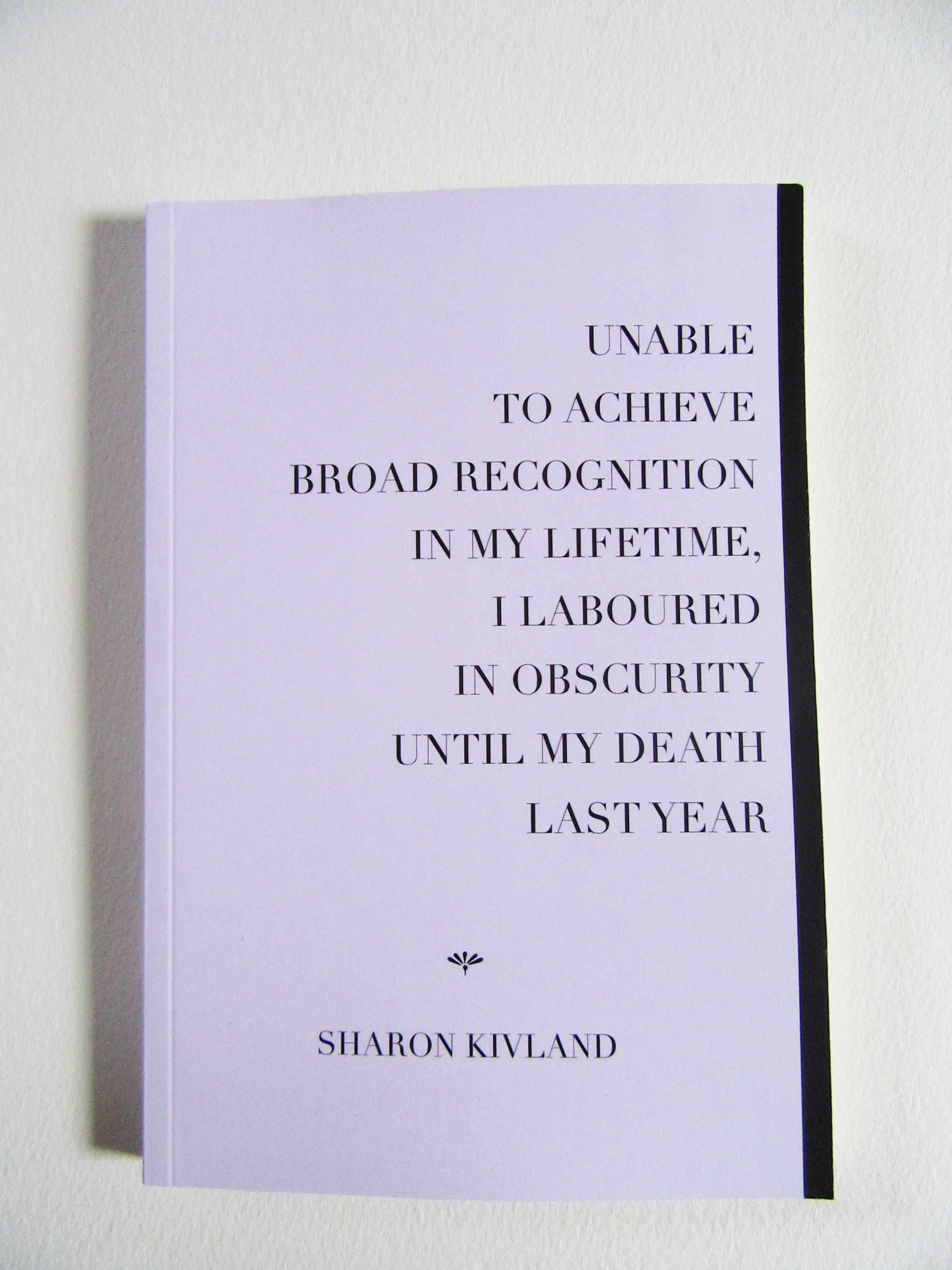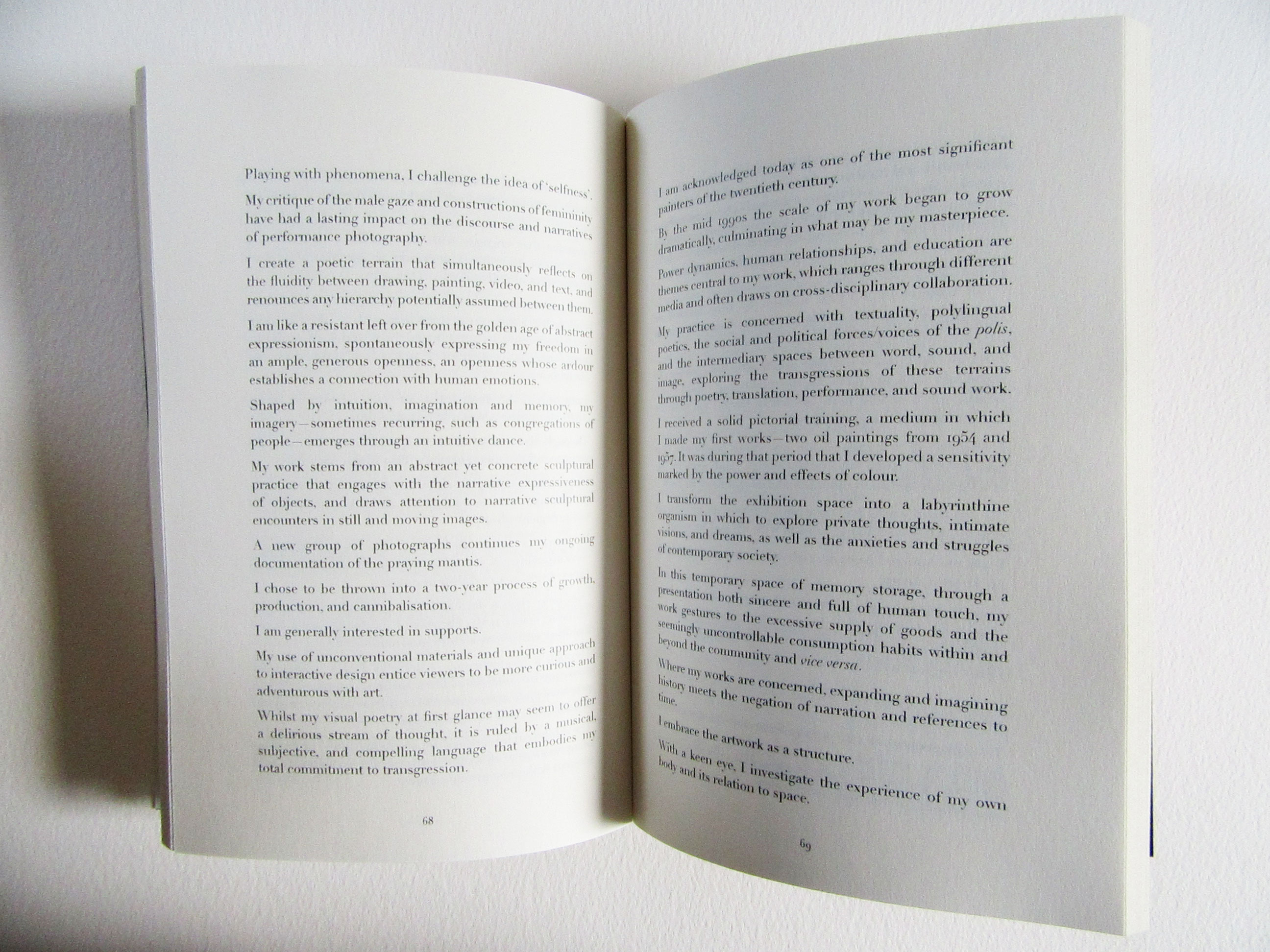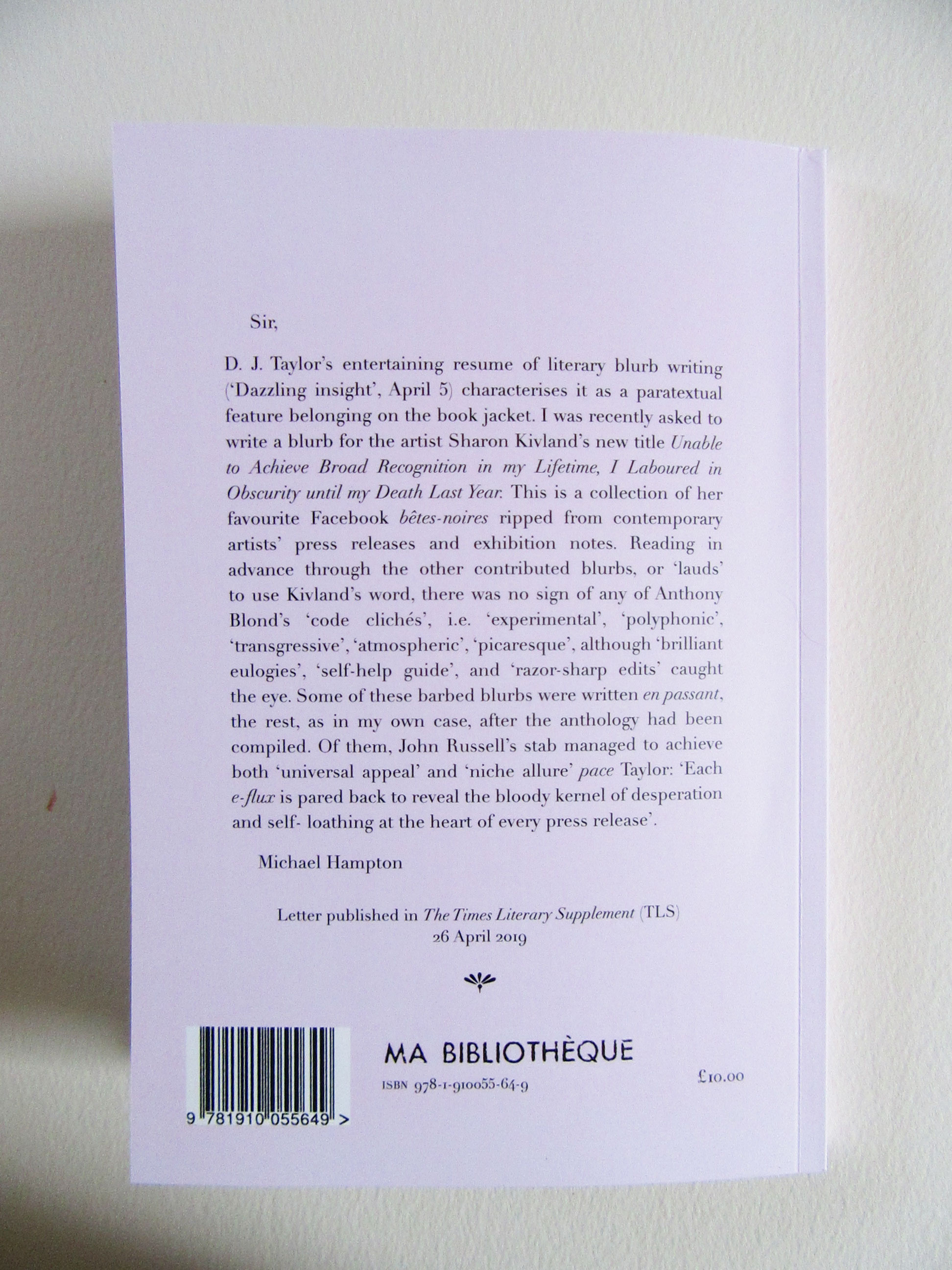Sharon Kivland
UNABLE TO ACHIEVE BROAD RECOGNITION IN MY LIFETIME, I LABOURED IN OBSCURITY UNTIL MY DEATH LAST YEAR, 2019



For nearly two years the author collected phrases from the exhibition press releases she received through email, posting certain of them on Facebook in a rather unsystematic way (that is to say, when she felt like it), with only one change, that of the personal pronoun, so each statement appeared vainglorious, absurd, even tragic. She supposes the measure was if they made her laugh or gasp or used words she deplores when thinking or writing about art. The posts gathered quite a following. Some people still mention them to her, and others have asked her to look at their own press releases before circulation. These extracts have provoked laughter, disbelief (especially when performed as public readings, when she has been obliged to swear to their veracity), self-recognition, and yes, shame. She had only three rules: 1) She would not quote the press release of anyone she knows (certainly she could have done—she must admit that both a friend and someone she dislikes intensely have slipped in, and she fervently hopes neither ever reads this book); 2) She would not alter anything except the pronoun (this is largely true; however, for this book, she corrected some errors of punctuation and spelling, changed spellings to their English form, and employed her beloved Oxford comma); and 3) She would not use anything the artist had written (this, too, is true, save for one exception that was too wonderful not to include). Finally, she gathered a collection of endorsements, some along the way, others when she indicated this work was done. She is still alive and she continues to labour in obscurity.
‘Me, me, meme. In a conscious act of reductio ad absurdum, Kivland gifts us a choice hoard of anonymised, contemporary artists’ statements. Stripped of context, they hang naked on the page, careerist vapour trails revealing a desperate need for attention—be it clad in dopey dogma or hustler’s hype—from the refrigerated art world. Sometimes shrill, always vainglorious, this massively expanded Pseuds Corner of tailored utterances hilariously catalogues an era of discursive mumbo-jumbo, for when the hard currency of the name is absent, claims of individual sovereignty—the dreaded spectre of genius—flail and flounder. So witness the group mind trapped in and by its own self-sanctioned, hegemonic idiolect, brilliantly generating a cacophony of gold-plated rot. Yes, we’re all charlatans now!’
–>Michael Hampton
‘The book has an incremental force that belies its absurdity, moving even as it becomes obvious that much of the content is brainless and barmy; after all, everyone is entitled to promote their own work, even if their mind has been hijacked by a trendy brand of discourse. It does prove that Art & Language were right to point out how studio work was being replaced by Public Relations, and practice subsumed by the lure of career. The reason Unable is so good is that it cuts across genres: 1. is a piece of conceptual writing we want to read (as Nathan Jones puts it); 2. is an assisted readymade, i.e. found material that has been grammatically altered; 3. is a primer (hinted at by Emmanuelle Waeckerlé); 4. is a sociological snapshot of the contemporary art scene. By the time I get to the end I fully expect to have been hollowed out and reached a new ground zero.’
–> Michael Hampton (on further reading)
‘Sharon Kivland has duly given us the defining discourse diptych of the decade, journeying down the dazzling venues of Total Commodification with prudent zest."’
(On A Lover's Discourse and Unable to Achieve. )
–> Christian A. Wollin
‘Me, me, meme. In a conscious act of reductio ad absurdum, Kivland gifts us a choice hoard of anonymised, contemporary artists’ statements. Stripped of context, they hang naked on the page, careerist vapour trails revealing a desperate need for attention—be it clad in dopey dogma or hustler’s hype—from the refrigerated art world. Sometimes shrill, always vainglorious, this massively expanded Pseuds Corner of tailored utterances hilariously catalogues an era of discursive mumbo-jumbo, for when the hard currency of the name is absent, claims of individual sovereignty—the dreaded spectre of genius—flail and flounder. So witness the group mind trapped in and by its own self-sanctioned, hegemonic idiolect, brilliantly generating a cacophony of gold-plated rot. Yes, we’re all charlatans now!’
–>Michael Hampton
‘The book has an incremental force that belies its absurdity, moving even as it becomes obvious that much of the content is brainless and barmy; after all, everyone is entitled to promote their own work, even if their mind has been hijacked by a trendy brand of discourse. It does prove that Art & Language were right to point out how studio work was being replaced by Public Relations, and practice subsumed by the lure of career. The reason Unable is so good is that it cuts across genres: 1. is a piece of conceptual writing we want to read (as Nathan Jones puts it); 2. is an assisted readymade, i.e. found material that has been grammatically altered; 3. is a primer (hinted at by Emmanuelle Waeckerlé); 4. is a sociological snapshot of the contemporary art scene. By the time I get to the end I fully expect to have been hollowed out and reached a new ground zero.’
–> Michael Hampton (on further reading)
‘Sharon Kivland has duly given us the defining discourse diptych of the decade, journeying down the dazzling venues of Total Commodification with prudent zest."’
(On A Lover's Discourse and Unable to Achieve. )
–> Christian A. Wollin
144 pages
205 mm x 140 mm
Paperback
ISBN 978-1- 910055-64-9
£12.99
Reprinting, available again in February
Next book ->
205 mm x 140 mm
Paperback
ISBN 978-1- 910055-64-9
£12.99
Reprinting, available again in February
Next book ->